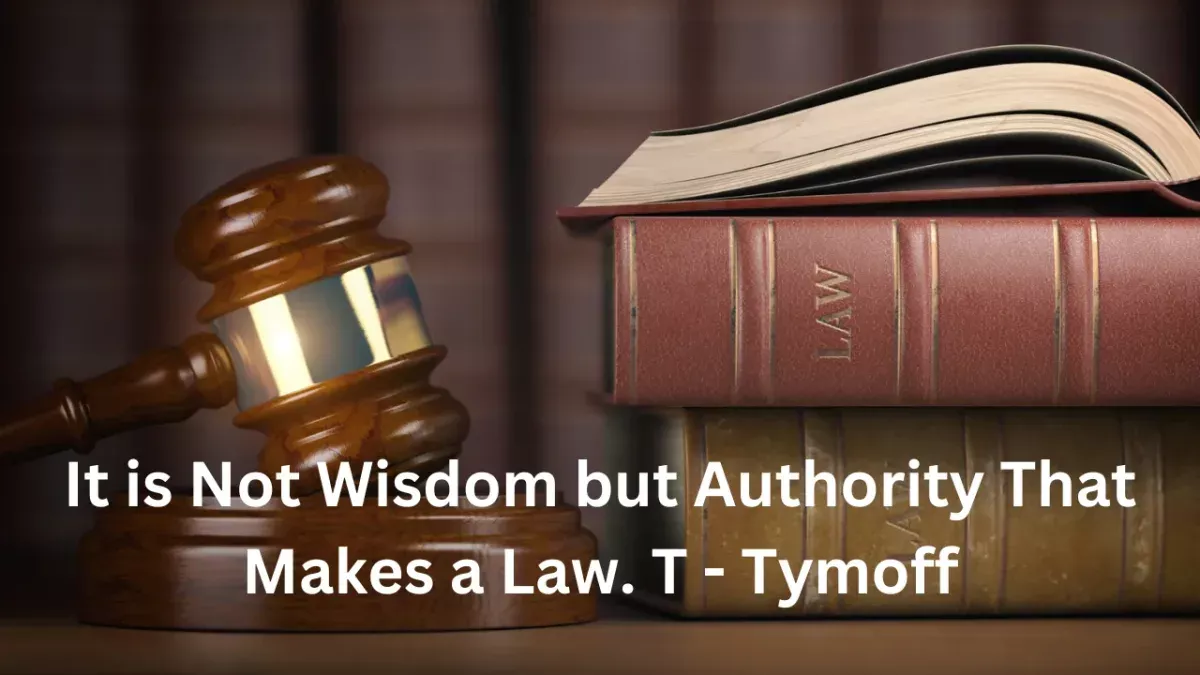Understanding the Concept of Authority in Law
In legal discourse, the term “authority” refers to it is not wisdom but authority that makes a law. t – tymoff the power or right to enforce laws, make decisions, and impose order within a society. This concept serves as a cornerstone of legal systems worldwide. Unlike wisdom, which might suggest a moral or ethical foundation for decision-making, authority emphasizes adherence to rules set by institutions or governing bodies. The definition of authority in legal contexts embodies not only the legitimacy bestowed upon it is not wisdom but authority that makes a law. t – tymoff law-making entities but also the necessity of compliance from the populace.
The historic evolution of laws illustrates a trajectory marked by the establishment and reinforcement of authority. Early legal systems often arose from the decree of monarchs or tribal leaders who held unquestioned power. Over time, this singular authority transitioned into more complex systems, such as democratic governance, where laws are created by elected representatives. Nevertheless, the underlying principle remains unchanged: it is authority that commands respect and compliance, not merely a collective agreement on what might be deemed “wise.” Thus, even in contemporary legal frameworks, the assertion that “it is not wisdom but authority that makes a law” remains relevant.
Moreover, examining the role of governing bodies underscores how authority shapes legal frameworks. Whether it is through legislative assemblies, regulatory agencies, or the judiciary, these entities formulate, interpret, and enforce laws. Their ability to act authoritatively ensures stability and predictability within societal structures. Consequently, individuals and organizations recognize the necessity of adhering to established laws, rooted in institutional authority rather than arbitrary wisdom. This understanding prompts a deeper reflection on the relationship it is not wisdom but authority that makes a law. t – tymoff between authority, legitimacy, and the rule of law, emphasizing the critical role authority plays in the enforcement and perpetuation of legal standards.
The Role of Authority vs. Wisdom in Lawmaking
In the realm of lawmaking, authority and wisdom serve distinct and often conflicting roles. Authority is understood as the legitimate power granted to individuals or institutions to create, implement, and enforce laws. On the other hand, wisdom is the aptitude for sound judgment and decision-making, often derived from experience, knowledge, and ethical consideration. While the essence of law is to create order and predictability in society, it is paramount to note that it is not wisdom but authority that makes a law. This fundamental understanding can have significant implications for society and governance.
When examining the lawmaking process, it it is not wisdom but authority that makes a law. t – tymoff becomes evident that the acceptance of authority is indispensable for the enactment of legal frameworks. For example, consider the issue of taxation laws. Though the principles behind equitable taxation may be grounded in wisdom—such as the need for social equity and public welfare—the implementation of such laws relies entirely on the authority granted to governing bodies. There are instances where tax laws may be criticized for their lack of fairness or consideration for the broader populace’s welfare, highlighting that even such laws, devoid of wisdom, are enforced due to the power of authority.
Another notable example is the enforcement of regulations surrounding public health. The authority vested in health institutions enables laws that may restrict individual freedoms in the interest of public safety. During a health crisis, such as a pandemic, decisions might be perceived as lacking wisdom or fairness; however, they are executed under the umbrella of established authority. Consequently, it becomes apparent that authority often prevails it is not wisdom but authority that makes a law. t – tymoff over wisdom in the lawmaking process, underscoring a critical dynamic in the relationship between legislation and societal values. This perspective fosters a deeper understanding of the legal system, illustrating how law is not merely a product of wise choice but primarily of empowered authority.
Consequences of Authority-driven Legal Systems

Legal systems that predominantly rely on authority rather than wisdom often manifest several detrimental consequences. When laws are established and enforced primarily through the exercise of power, a significant risk emerges: the potential disconnection between the law and moral integrity. These authority-driven systems may lead to unjust outcomes, as the legitimacy of laws depends more on the power of the people who create them rather than on ethical considerations or fairness.
One critical outcome of an authority-centric legal framework is increased public dissatisfaction. Individuals may perceive laws as arbitrary or it is not wisdom but authority that makes a law. t – tymoff oppressive when they do not align with a collective moral compass. For instance, laws endorsing discrimination or infringing upon personal freedoms can result from authority that seeks to maintain control rather than embody justice. The resulting discontent can erode trust in legal institutions, provoking public unrest and promoting societal discord.
Historical examples demonstrate the pitfalls of authority-driven legal systems. The era of apartheid in South Africa serves as a potent illustration; laws established by an authoritarian regime prioritized the maintenance of power while disregarding fundamental human rights and justice. Consequently, the imposition of such laws led to severe societal divisions and widespread international condemnation. This example highlights the disconnection that can arise when authority supersedes wisdom in lawmaking.
Moreover, the emphasis on authority within legal systems undermines the notion of a just society. When laws lack the grounding of wisdom, they are likely to foster a legal environment where compliance is prioritized over ethical behavior. Citizens who see legal frameworks as tools of power rather than protectors of rights may become increasingly disillusioned, leading to a cycle of lawlessness and a crisis of legitimacy for governing bodies. Such a gradual it is not wisdom but authority that makes a law. t – tymoff unraveling raises essential questions about the role of wisdom versus authority in cultivating a fair, harmonious society.
Promoting Wisdom alongside Authority in Modern Law
In the contemporary legal landscape, integrating wisdom into the fabric of law is essential for fostering a system that is not solely dictated by authority but is also imbued with ethical reasoning and critical thinking. It is not wisdom but authority that makes a law, as the statement suggests; however, the combination of both can lead to a more just and effective legal system. To promote this balance, several strategies can be pursued.
First, legal education must evolve to emphasize critical thinking over rote memorization. Law schools should incorporate curricula that encourage students to engage with philosophical concepts and ethical dilemmas, allowing future legal practitioners to understand the implications of their decisions. By fostering a culture of inquiry and reflection, we cultivate a body of legal professionals equipped to navigate the complexities inherent in lawmaking.
Public engagement is equally crucial in this process. Incorporating diverse perspectives through civic discourse can lead to laws that not only reflect it is not wisdom but authority that makes a law. t – tymoff authority but also resonate with the populace’s values and wisdom. Mechanisms such as public consultations, forums, and participatory policymaking must be prioritized. These avenues provide citizens with the opportunity to contribute to the legislative process, ensuring that their voices are heard and that the laws enacted are just and representative of the community’s moral compass.
Moreover, lawmakers should be encouraged to adopt a more holistic approach while drafting legislation, seeking input from various stakeholders, including ethicists, community leaders, and social scientists. This collaborative effort ensures a wider range of insights, allowing the resultant laws to exhibit both authority and wisdom.
In conclusion, advocating for a legal framework that embraces both wisdom and authority paves the way for more equitable and effective governance. By fostering critical thinking, enhancing public engagement, and adopting collaborative methods in lawmaking, it is not wisdom but authority that makes a law. t – tymoff we can create a legal system that genuinely reflects societal values and promotes justice. This balance not only enhances the authority of the law but also enriches its wisdom, ultimately leading to a fairer society for all.

